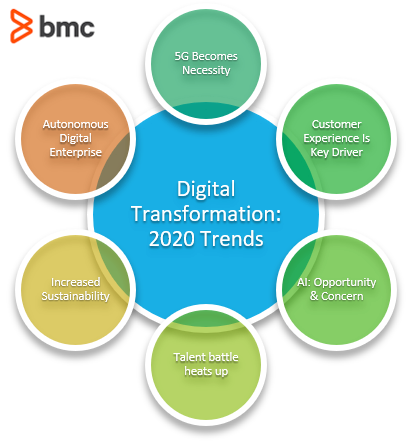Digital transformation encourages business organizations to adopt new technologies in order to deliver better value to their customers. DX transcends traditional channels of customer engagement, such as marketing and advertisements, and encompasses the processes, culture, technologies, and experiences that collectively determine the business value reaching the right customers at the right time.
At the same time, embracing digital transformation saves business organizations valuable resources and generates new revenue streams. DX-focused technology solutions and service models operate productively and scale their services with agility.
In this article, let’s explore what’s trending in digital transformation:

1. 5G-enabled will soon be a necessity
The year 2020 marks a fundamental shift in the way organizations operated, with many employees forced to work remotely, relying on fast internet resources to replicate the in-the-office work experience at home.
Telco giants have been on track to deliver on their 5G promises around the world:
- Verizon launched test labs in California.
- Ericsson quickly increased its 5G networking hardware subscriptions to China.
- Qualcomm reported over 60% earnings from 5G related hardware product shipments.
Among 380 telco operators investing in 5G communication services, 80 operators have already rolled out their services in 35+ countries.
What does this mean for businesses? The fast-paced transition to a 5G-driven era means that employees and consumers will expect improved digital experiences that will require investments in 5G technologies. It’s expected that most tech companies will continue to encourage their workforce to work from home. 5G internet speed will be instrumental in improving all digital experiences currently limited by slow internet.
Similarly, consumers will expect more responsive, data-driven services, especially as AR/AI becomes a reality in the 5G era.
2. Customer experience is driving DX
Customer experience improvement is an important goal of digital transformation initiatives.
With more customers and employees relying on digital technologies to access business services, both the technologies themselves and the digital transformation strategies will be crucial for successful customer experiences.
According to recent research that sampled more than 150 C-suite executives at various large and midsize organizations, optimizing customer experiences is a primary focus of digital transformation initiatives. Other priorities include:
- The use of data-driven marketing capabilities
- Media creation for improved digital experiences
- Automation and IoT solutions
- Expanding the reach to mobile customers
According to another survey conducted by HBR, 84% of the 783 respondents regard 2020 as the inflection point of disruption. Digital is regarded as a key growth and revenue driver by these respondents, citing digital revolution as instrumental to bringing new, highly relevant, and valuable customer experiences. Digital technologies will not only be used as a medium to deliver information and services, but to enhance:
- Operational efficiencies
- Informed decisions
- Speed of response to market changes
- Other value propositions
The HBR report also found that only a small proportion (16%) of the organizations can be regarded as Highly Digital—that is, organizations that have products and operations highly dependent on digital technologies. A majority of organizations (61%) are Hybrid, with products and operations depending highly both on digital technologies and traditional manual processes. Yet, around a quarter of businesses (23%) are Non-Digital in nature, with only a few products and operations depending on digital technologies.
The research also indicates that leaders in customer experiences mostly belong to the class of Highly Digital organizations, while industry laggards belong to the Hybrid or Non-Digital categories.
3. AI is both opportunity and concern
Artificial Intelligence promises immense value in the domain of customer experience improvement. Access to the right set of data, tools, and talent enables business leaders to leapfrog the competition and deliver more meaningful digital experiences.
For example, AI enables ecommerce companies to reach the right audience with the most relevant products. However, this also requires them to invest significantly in the right talent and technologies.
Still, automation and intelligence are not entirely convincing to organizations that are primarily non-digital in nature. For such companies, automation and AI inherently means mass unemployment in the industry as the technology takes over. This is relevant not only for traditional industries such as construction and manufacturing, but also for financial services (45%) and business service (43%) industries anticipating loss of employment due to AI and automation.
4. Talent battle is heating up
In order to win at digital transformation, organizations must have the right talent onboard. After all, we already know that engaged employees are good for business.
According to the above research, C-suite executives consider talent retention the chief concern in 2020. Addressing these challenges requires not only the right incentives to attract a skilled workforce, but also the right culture to retain the talent.
To succeed at attraction and retention, organizations are expected to:
- Invest in talent acquisition initiatives to reach a wider yet more relevant talent base
- Offer programs for continuous learning and improvement
- Provide opportunities to grow within the organization
We’ve previously discussed various causes of the IT skills gap, including its severity across industries and the appropriate response to transform workforce development. One of the key concerns highlighted is the growing skills instability: skills relevant today may no longer suffice tomorrow. Organizations should prepare for this challenge ahead of the competition as the industry widely adopts digital transformation initiatives highly dependent on skillful talent to grow their business.
5. Sustainability is critical
One significant reason for digital transformation is to reduce your carbon footprint and operate as a sustainable and green organization.
We increasingly judge companies on their contributions to society. The goal of digital transformation can be far more overreaching than improving business value to end-users. Importantly, business organizations can transition from traditional, carbon-heavy business operations to digital-first environmentally friendly business operations. That’s why organizations are advertising (proclaiming) their positive contributions in this regard, with commercials, advertisements, and sustainability reports, citing the use of technology and its impact on energy and environmentally friendly sustainable operations.
(Learn how mainframes are key to operational sustainability.)
Future trend: BMC powers the Autonomous Digital Enterprise
A future trend in digital transformation will be this: improving your company doesn’t stop with DX. Empowered by digital transformation, organizations can be on their A-game and evolve to become an Autonomous Digital Enterprise, a forward-looking vision of the future state of business that embraces intelligent, tech-enabled systems across every facet of the business to thrive during seismic changes.
Where DX seems like a one-and-done activity, becoming an ADE helps you continuously evolve and stay competitive in an ever-shifting world—just as we’ve seen this year. Autonomous Digital Enterprises rely on five key tenets:
- Delivering a transcendent customer experience
- Applying automation everywhere
- Supporting enterprise DevOps
- Driving data-driven business outcomes
- Safeguarding through adaptive cybersecurity
(Learn more about how BMC supports the ADE journey.)
Additional resources
For more on DX and technology trends, explore these articles:
- BMC Business of IT Blog
- 2020: IoT Ecosystems, Hyper Automation, and Actionability to Take Center Stage
- How to Create Transcendent Customer Experiences Driven By Data
- IT Spending Trends of 2020
- Cloud Growth in 2020: Trends & Outlook
- The 2020 State of the CIO
The Autonomous Digital Enterprise
These postings are my own and do not necessarily represent BMC's position, strategies, or opinion.
See an error or have a suggestion? Please let us know by emailing blogs@bmc.com.







